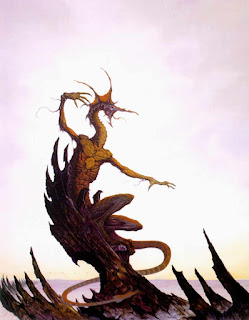Your job as GM/DM/Referee is to write half the story. The player characters are the other half. If you find yourself writing their bit then YOU ARE DOING IT WRONG*. The GM presents the problems, the players provide the solutions. If their solutions don’t match your expectations you are honour bound by the Great GM Code Article 1 to play them out regardless.
Now, I realise that this may seem elementary to my three or so regular readers but from my consumption of RPG related social media (here read Twitter in particular) it seems to have been lost somewhere along the way in certain GMing circles. What I’m saying is no matter how much you think it will make the game better, do not railroad the players. Even in secret. They’ll work it out and fun will cease.
 |
| Old School GMs be like... |
I like fantasy fiction as much as the next nerd but stories and games are two separate things. A game is played, that’s how you find out what happens, then you have a story. Not the other way round. The player characters must be able to make meaningful choices, even if the choices they make are rubbish ones. Even if it means the game gets a bit shit for a while, even if they all die, even if it short circuits the Really Cool Encounter you had planned. If the players choices don’t matter then you aren’t really playing a game with them, you are subjecting them to your fantasy fiction and trust me, despite what your mum told you, it’s probably not even good.
Now, obviously it’s your game and you can run it however you want. If your players are cool with being railroaded all the time, or even some of the time, then also that’s fine I guess. It’s not my sort of fun but each to their own. The so called agency of the players is important to me, they must be able to make their own choices and for those choices to have meaning.
What that means if you’re a player in my game is that sometimes you might face problems, dilemmas or obstacles that I have no idea how you’re going to surmount. That’s good. Especially as every time I think “The players will probably do X at this point...” they almost universally do not. That element of uncertainty is good for a GM, it is the thing that allows you to actually play the game. When the player characters do something unexpected, play it out. Improvising around PC actions is some of the best fun you can have as the referee. You can make it easier for yourself by having a decent understanding of NPC motivations, so that they react realistically to PC behaviour. Also by having at least a vague idea of what will happen if the PCs do not interact with your hook. The world should carry on. It can often be worked out later (between sessions) what the consequences of the PCs action/inaction and this will be fuelling your prep for the next session.
One of the great things about RPGs is that they can go anywhere. There is no board. No boundaries. Don’t shackle the game to your preconceived story. Do not limit the possibilities, embrace them.
*This is just my opinion, there is no objective “right way” to play RPGs.






